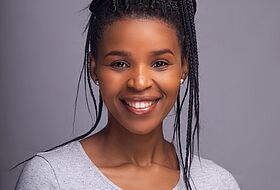Roles Performed
2020 La Ciesca, Gianni Schicchi (G. Puccini), SA Operatunity, South Africa
2019 Romeo, I Capuleti e i Montecchi ( V. Bellini), Cape Town Opera and University of Cape Town, South Africa
2018 Fidalma, Il Matrimonio segreto (D. Cimarosa), University of Cape Town, South Africa
2017 Annio, La Clemenza di Tito (W. A. Mozart), University of Cape Town, South Africa
Roles Studied/Covers
2020 Dorabella, Così fan tutte (W. A. Mozart)
Education
2020-21 Postgraduate Diploma in Performance (Opera), University of Cape Town, South Africa
2019 Advanced Diploma in Music Performance (Opera), University of Cape Town, South Africa
2015-18 Diploma in Music Performance (Opera), University of Cape Town, South Africa
Competitions and Awards
2019 1st Prize, Schock Foundation Singing Competition, University of Cape Town, South Africa
Dated: Summer 2022
How did you come to music?
I started singing at a very young age (6 years old) in primary school. After primary school I went to high school and that's where I first faced opera music. I was then chosen to be one of the school’s soloists and sang an opera extract from Die Zauberflöte (wie! wie! wie!) 3rd lady. During that year I went to watch an opera for the 1st time (Porgy and Bess, Cape Town Opera 2006). After this experience I immediatley knew that I was destined to be an opera singer. After matric I studied Dental Science, graduated, and went to work. But because the calling of being an opera singer kept haunting me “so much that most of our patients knew that I could sing”, I then applied to study opera at University of Cape Town (South African College of Music) in 2015. That's when I started enjoying what I knew to be my calling/destiny, and that was the best decision I've ever made.
What do you consider your most important mission as an artist?
I believe that as artists we are messengers, it is us who can influence the world’s day to day living. But most importantly, my mission as an artist is to make it a point that the listener (audience) is satisfied and gets the story that I am telling. To be able to do that I “must” forget about the person that I am and insted focus on portraying the character at hand close to perfection. Because I also believe that we deal with a lot of emotions, it is us “artists” who are capable of healing the broken souls of our audiences, and as much as we also get healing in the process, it should be in our best interest to heal others through our artistry. “We are the servants and everyone else is the receiver”.
Logic or Emotion?
I think they go hand in hand. For instance: one needs logic during the period of studying the role “music and characterization”, then when you feel like you’ve studied enough and you know all the technicalities of the role, then you can start to bring emotions in. Remember we tell stories that were written hundreds of years ago, and we tell them today in different times, so it's very mandatory for one to bring emotions in so that you can be able to access what the composer wanted when they wrote the composition and to be able to connect with your audience spiritually and emotionally. Moreover, emotions give you direction in the process of trying to internalise the character at hand. So I’d say they are both required to achieve the best results at the end.
| Composer | Opera/Operetta | Aria | Role | |
|---|---|---|---|---|
| 1 | Georg Friedrich Händel | Giulio Cesare | Svegliatevi nel core! | Sesto |
| 2 | Gioachino Rossini | La Cenerentola | Nacqui all' affanno | Angelina |
| 3 | Giacomo Meyerbeer | Les Huguenots | Nobles seigneurs, salut! | Urbain |
| 4 | Samuel Barber | Vanessa | Must the winter come so soon? | Erika |
| 5 | Wolfgang Amadeus Mozart | La Clemenza di Tito | Parto, parto | Sesto |
